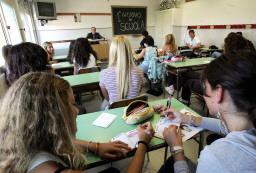A school in the northern city of Trento is inviting the parents of rowdy children into the classroom in an effort to check bad behaviour and prevent bullying, it said Wednesday. The secondary school, which trains children to become accountants, has asked some mothers and fathers to sit in on first-year lessons for a few hours each day after a series of episodes involving bullying and vandalism.
Incidents of bad behaviour by the future book-keepers included throwing break-time snack wrappers and empty drink cans on classroom floors, making holes in the walls and failing to treat their teachers with respect. ''The parents will not be there to control things, because the teachers know how to do their job,'' explained headmistress Francesca Carampin in an interview with daily newspaper Trentino.
''But if a child knows that his parents are interested and are participating in his school life, he will be more motivated to follow lessons''.
She said problems were most acute in the first year as children tried to settle in at their new school.
''The negative elements in the classes tend to be taken as a model, dragging with them the weaker children, while the better-behaved children in the class keep their mouths shut,'' Carampin said.
''Young people today tend to talk back to adults, putting themselves on the same level and failing to distinguish between roles,'' she added.
The headmistress said the experiment will also offer the families of the children a chance to meet each other and form a community that will become involved in daily school life.
In the last few years schools in Italy have been rocked by a string of bullying scandals, some of which have ended up on the Internet after the incidents were filmed by pupils on mobile phones.
According to a study released in December by the Italian Pediatric Society, bullying has risen by 6% in the last two years with almost three-quarters of young teenagers between the ages of 12 and 14 saying they had either witnessed or been affected by incidents. More boys than girls said they had some experience of bullying: 75.6% compared to 69.1%.




